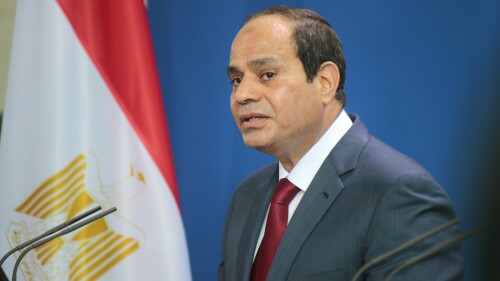Recent violent events in the Palestinian refugee camps of Lebanon, as well as the internecine Palestinian fighting raging in Gaza, are a stark reminder of the inherent instability of the current Palestinian political culture and the rise of extremism within the population.
Along with the explosion in Lebanon, there have been weeks of street fighting in Gaza between Hamas and Fatah activists. Palestinian President Mahmoud Abbas has called for resumed negotiations with Israel while Hamas has rejected this possibility. The inter-Palestinian violence also heralded a new barrage of Kassem rockets launched at Israel — more than 150 in the past weeks.
In Lebanon, it seems the refugee camps have been effectively taken over by a new al Qaeda-linked terrorist faction called Fatah al-Islam. Long an epicenter of factional extremism in Lebanon, the Palestinian camps are a hotbed for breeding and exporting terrorist activists. One common denominator between the refugee crisis in Lebanon and the violence in Gaza is the involvement of the U.N. Relief and Works Agency (UNRWA). Founded in 1949 after the passage of U.N. Resolution 194, the organization was to take over immediate relief and more long-term work projects designed to make the refugee communities self-sufficient, pending a political settlement.
This group is a unique body that has no other parallel in the U.N. system. Millions of refugees worldwide fall under the responsibility of the U.N. High Commissioner for Refugees, which aims to resettle and rehabilitate the refugees. But the relief group was created as a separate body whose jurisdiction is solely the Palestinians. UNRWA defines the term “refugee” in the broadest terms by including not only those Arabs who fled from territories held by Israel, but also those who stayed in their homes and lost their source of livelihood as a result of war. Today, this would include all third- and fourth-generation children of refugees, even those of just one Palestinian refugee parent.
Historically, UNRWA is the main vehicle for the perpetuation of the focus on the Arab-Israeli conflict in the United Nations. In contradistinction to the human-rights group, UNRWA is an apparatus that maintains the status quo; the office has no incentive to develop a resolution of the Palestinian refugee problem. As one of the largest employers in the host countries that have Palestinian refugee camps, UNRWA is staffed in situ mainly by local Palestinians — more than 23,000 of them, with only about 100 international U.N. professionals. The pattern of hiring within the served population is unique in the U.N. constellation — UNHCR considers hiring agency recipients a conflict of interest. The bureaucracy has created an infrastructure of dependency whereby Palestinian refugees rely on UNRWA services (medical assistance, jobs, education) but do not plan or implement any solutions that may endanger their livelihood by rendering themselves obsolete.
UNRWA serves as a crucial tool of legitimacy for the Palestinian refugee issue — as long as the office is active, how could anyone question the Palestinian refugee problem? Thus an oxymoronic situation: Despite the Israeli disengagement from Gaza in 2005 and the creation in 1993 of a Palestinian Authority with jurisdiction over the Palestinian refugee camps in Gaza/West Bank, UNRWA remains the key social, medical, educational and professional service provider for Palestinians living in “refugee” camps. This runs contrary to every principle of normal territorial integrity and autonomy.
UNRWA’s budget has been funded by many nations, of which the United States and other Western nations have been the largest contributors. By 2000, UNRWA’s budget was $365 million. UNRWA is beset by bureaucratic difficulties and has not escaped the internal conflicts that have overwhelmed the Palestinian political landscape. More disturbing are the widespread reports of terrorism emanating from UNRWA-supervised facilities — including sniper attacks from UNRWA-run schools, bomb factories in UNRWA camps, transportation of terrorists to their target zones in UNRWA ambulances — even employees directly related in terrorist attacks on civilians.
All this should bother Americans because American funding makes up more than a third of the agency’s budget — so American dollars are funding terrorist activities in a fairly direct way. And now, that terrorism isn’t only about fighting against Israel. The infiltration of al Qaeda into the camps in Lebanon signals that such activity is almost certainly also going on elsewhere — in southern Lebanon, Syria, Jordan and in Gaza and the West Bank. Combined with the other terrorist actors seeking to foment instability and gain influence (Hamas, Hezbollah, Islamic Jihad, Fatah, etc.) at the expense of regional stability, the prospects for the exportation of terror are most alarming.
It is therefore not surprising that the Palestinian agenda — and sympathy for the Palestinian cause — has infiltrated every aperture at Turtle Bay. It has engendered Arab and Western support for the delegitimation of Israel. Fighting the war against terror entails clamping down on those institutions that perpetuate the ideology Islamist groups spread. UNRWA and the U.N. as a whole have transformed themselves into a propaganda machine for such thinking. America as a shareholder should take a very close look at where our money is being spent. It is crucial that the United States seek a true international body that represents the entire global community and not buy into the myths groups like UNRWA try to sell us.
Nicole Brackman is a former Soref Fellow at the Washington Institute for Near East Policy. Asaf Romirowsky is an Associate Fellow at the Middle East Forum and Manager of Israel & Middle East Affairs for the Jewish Federation of Greater Philadelphia.







